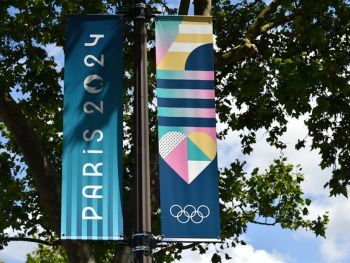University News Last updated 19 July 2024

The volatile political situation in France could lead to protesters attempting to hijack events when the Olympics get underway in Paris this month, according to a Birmingham City University (BCU) policing expert who was part of security operations at the 2012 London Games.
O’Bryan Grandison, a former police officer, warns any demonstrations in the wake of the recent presidential elections might spark other protests but believes security plans for the global showpiece will cater for all eventualities.
“Whether it’s far-right protests, demonstrations for or against human rights infringements and everything in between, the planning process won't change,” he said.
“The policing operation will be informed by the national security threat level and draw upon intelligence from the UK and other global sources.”
More than 16 million tourists are expected in Paris during the Olympics and Paralympics this summer – as well as nearly 15,000 athletes from around the globe.
Although the opening ceremony is on 26 July, the Olympics begin on 24 July and run until 11 August at 15 venues across the French capital.
The Paralympics then run from 28 August until 8 September at 11 venues across the city.
“Games venues will have several cordons thrown around them, each with its own level of visible and non-visible levels of security, from security officers and cameras to physical barriers and people conducting regular searches,” said Grandison, Senior Lecturer in Policing at BCU.
“Public safety is probably the biggest risk given the volume of people who will be in Paris, so minimising the risk of overcrowding at indoor as well as outdoor spaces, ensuring people are able to move quickly and safely away from those places, will be crucial.
“It is about keeping visitors, residents and participants safe, whilst being able to enjoy the Games. To have a safe and successful Games is always the aim.”
Violent clashes broke out in Paris both during and after the recent presidential elections in France, which saw an initial surge in support for the far-right National Rally.
The country was already in a state of heightened security after raising its threat level in October when a teacher was killed in a knife attack in a school in Arras. In December, a German man died and two others were injured in a knife and hammer attack in a street in central Paris.
As many as 35,000 police and security officers are expected to be mobilised each day during the Olympics, with a peak of 45,000 for the opening ceremony.
“Officers will be supported by volunteers to provide direction and act as information hubs,” said Grandison. “These volunteers will also be the eyes and ears of the police, collecting information on anything suspicious and contacting officers on the ground where necessary.”
Armed officers and soldiers will also be deployed across the city.
“In UK culture, deployment of armed officers can be alien as we do not arm all police officers as a matter of routine,” said Grandison.
“It is a useful deterrent, not only against acts of terror, but for crime in general.”